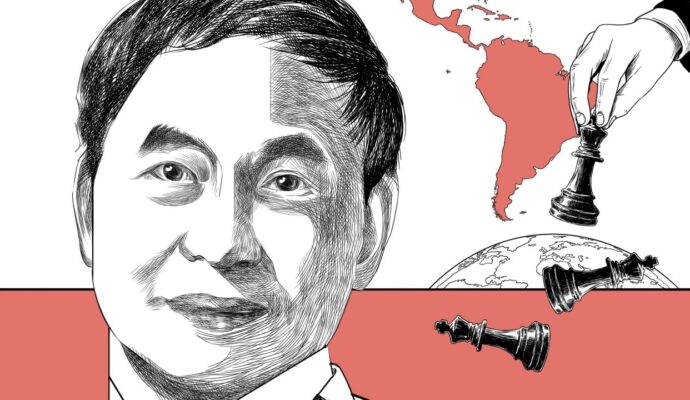But the drive has raised concerns about the already limited space for artistic impression, faced with the party’s aims to bring China’s online, celebrity and media into line with government policy and “Xi Jinping Thought”.
Lynette Ong, a professor of political science at the University of Toronto, said the cultural law enforcement appeared to be aimed at “cleaning up people’s minds”.
“It’s like ideological domination directing people, telling them what they can or cannot believe or practise or utter in public,” she said.
Some of Li Haoshi’s jokes have been deemed to be “humiliating” to the Chinese military. Photo: Weibo
Li’s case grabbed media attention again last Monday, when a notice said the Beijing theatre he performed in was also fined 100,000 yuan.
A company under Shanghai Xiaoguo Culture Media, the troupe Li worked for, had also been fined 70,000 yuan for “engaging in unauthorised commercial performance business”, a separate notice the same day said.
The latest penalty was also related to the Li case, Shanghai Xiaoguo said on Tuesday, while pledging that “we will never resume any performance without receiving official permission”. All Shanghai Xiaoguo performances nationwide had earlier been suspended as penalty for the Li incident.
This comes as the party’s central leadership pushes for ideological “unity of thought” under Xi’s political doctrine – Xi Jinping Thought on Socialism with Chinese Characteristics for a New Era – which was enshrined in the constitution in 2018.
Xi himself has also been promoting the mix of Marxism and Chinese traditional culture, and elevated culture work to the level of national security a decade ago.
Cultural law enforcers in cities other than Beijing also appear to be taking a more active role in supervising entertainment venues and comedy clubs.
Officers in southwestern mega city Chongqing inspected entertainment venues last week, including businesses running popular “escape room” and role-playing murder mystery games, state-owned Chongqing Daily reported. They identified content deemed “bloody and violent” or as “distorting history”, the report said.
It did not specify any punishments, saying only that those guilty of “minor offences” – and had rectified them – were not penalised.
Enforcers in the eastern city of Ningbo and Dingxi in the northwest had also conducted citywide inspections of stand-up comedy clubs in recent months, media reports said.
Organisers of offline events in China are already required to obtain approval from their corresponding local cultural regulators, and events like stand-up comedy shows need to submit scripts to be reviewed in advance.
The cultural law force was included in a 2018 reform plan for party and state institutions, aimed at consolidating administrative law enforcement with dedicated teams also for market supervision, ecological and environmental protection, transport and agriculture.
Under the guidance of the Ministry of Culture and Tourism, the force is responsible for supervising issues and events related to culture, historical artefacts, publishing, radio and television, films and tourism.
Sida Liu, a professor of law and sociology at the University of Hong Kong, noted that the force was not newly created in 2018. The ministry had issued a regulation on it as early as 2011, and it went into effect in 2012.
“Therefore, for over a decade, the cultural law enforcement forces have had a solid legal foundation from this ministry regulation,” Liu said.
“However, the challenge lies in their enforcement. The recent crackdown on stand-up comedy exemplifies the ‘campaign-style law enforcement’ approach often taken by Chinese administrative agencies in response to high-profile cases or incidents.
“The issue is not the legality of these forces, but rather how to prevent excessive use of power during such campaigns.”
Late last month, the cultural law team in northeastern China’s Heilongjiang province held a uniform-wearing event in the city of Jiamusi, exhorting all teams to “resolutely guard the baseline of ideology and cultural safety”.
Their peers in Shaanxi and Zhejiang provinces put up similar events earlier this year, while those in Beijing, Shanghai, and the provinces of Fujian and Yunnan held them last year.
Cao Pengcheng, party chief for Beijing’s cultural law enforcement force, urged officers to use the event “as an opportunity to forge an all-round hardened cultural ‘iron army’”. Calling on officers to be “loyal defenders” of Xi, he said they must stand ready to “safeguard the political, ideological and cultural security of the capital’s cultural market”.

